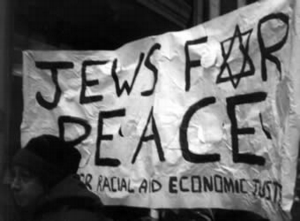 December 07
December 07
Why Social Justice Needs Religion
Jo Ellen Green Kaiser
 Globalization is the extreme expression of capitalism; it functions under the sign of alienation. The irony of globalization is that, as the world draws closer together, each of us is more separated than ever before. Increasingly, we define ourselves primarily in terms of our economic role. We ask each other, on meeting, “what do you do?” and not “what do you enjoy?” or “where—or with whom--do you live?” Our weeks are divided into work time and leisure, which too often means a time to produce and a time to consume, with no let up from the economic merry-go-round.
Globalization is the extreme expression of capitalism; it functions under the sign of alienation. The irony of globalization is that, as the world draws closer together, each of us is more separated than ever before. Increasingly, we define ourselves primarily in terms of our economic role. We ask each other, on meeting, “what do you do?” and not “what do you enjoy?” or “where—or with whom--do you live?” Our weeks are divided into work time and leisure, which too often means a time to produce and a time to consume, with no let up from the economic merry-go-round.
Our alienation increases as we succeed. With each success, we pull away from others. We move to large houses in gated communities that allow us to “cocoon” without ever meeting our neighbors. We buy devices that allow us to “personalize” our entertainment, which means that each of us listens to music or watches a film separately from others, often via headphones that cut us off from the rest of the world. Even our cell phones, which should connect us to others, allow us to filter those connections, to separate ourselves from the bodies around us in order to listen to the disembodied voices of those we may rarely meet in person.
We desperately want to be with—we are, after all, social animals—yet we are often so exhausted from the constant pull upon us to do and to buy, to produce and consume, that we feel barely capable of simply being.
Direct Service in an Atomized World
In such an alienated environment, direct service is often the easiest way to express our longing for a larger community. Direct service is the call to serve another in the way we ourselves would want to be served. It is the call of Isaiah to ensure that no one is naked while we are clothed, or the call of Elijah that no one is hungry while we feast, expressed in action we ourselves take.
Direct service is not easy; it requires a commitment of time and energy, both of which are often in very short supply. Why should I spend a half-day in a soup kitchen after a 60 hour week? Why should I clean others’ detritus from the local park when I could be taking a well-deserved rest there myself? Direct service asks us to confront the egocentrism that our economy provokes. It asks us to be for the other, on occasion, rather than always for ourselves.
The value of direct service, as opposed, say, to merely writing a check, is that it puts us face to face with each other. Anyone who has ever worked in an intake center knows the value of meeting a homeless person and being able to strip off that label (an economic label, signifying that they neither produce nor consume) to find another way to connect—a person who is a son or daughter, a person who has thoughts and feelings not unlike our own. Direct service also gives us the opportunity to meet others who have put aside their leisure to serve. The work can create a bond between us, especially among the most “active” among us who come regularly to serve others. We become united by our interest and by our compassion.
 Many, however, find that they cannot sustain these efforts. Activists call it “burnout.” Though we value our service, the pressures of our lives seem to always intrude, to be more insistent. “I can’t come this week; I haven’t yet done my grocery shopping.” “I have to miss the meeting, I have a work meeting to attend.”
Many, however, find that they cannot sustain these efforts. Activists call it “burnout.” Though we value our service, the pressures of our lives seem to always intrude, to be more insistent. “I can’t come this week; I haven’t yet done my grocery shopping.” “I have to miss the meeting, I have a work meeting to attend.”
A few years back, I became involved in a food program for the homeless. Every Wednesday we served dinner to 150 people, and then we sat at their tables and broke bread with them. I loved the experience. I felt good feeding others, and I enjoyed learning their stories. I felt less threatened by the people begging on my city’s streets. I enjoyed the company of the other people who had gotten involved in the project. But after a few months, I found myself not showing up without really knowing why. Nothing about the experience had changed. Suddenly I had “more important things to do.”
Even worse, direct service had not changed my fundamental way of being in society. Direct service asked me to act as an individual serving other individuals. It was like a great working experience, but without the pay. Yet because it was nothing more than that, nothing held me to the work other than my own interest and conviction.
In many ways, direct service builds upon the model of interpersonal interaction endemic to our society. We act as monads, going about our tasks and taking our pleasures under the aegis of our individual relationship to the larger whole. The bonds we make are entirely our own, to be formed or broken at will. This is the “mobile” society, the society that allows us to move freely from place to place, from job to job, but also from person to person. Nothing anchors us.
In such a world, direct service will always find participants, and will never keep them.
A Deeper Tikkun Olam
The work of justice requires more than individual efforts at soup kitchens and homeless shelters. It requires that we change the world.
In Judaism, we say our work is the work of tikkun olam, the repair of the world. The metaphor is apt, because it tells us a story of a world that has fragmented, atomized, and can only be whole if we put it together. But how do we do that?
First, from the experience of direct service, we learn that the work of tikkun olam cannot be pursued by each of us, acting individually. If the deepest problem of our society is its fragmentation, the answer cannot be for us to work alone, each tending her own garden, or even that of another, hoping that such individual endeavors will add up to a whole. Empowering rhetoric notwithstanding, they won't. True repair requires that we have not merely a fulfilling leisure time activity, but another way of understanding the world in which we live, an understanding not guided by the exigencies of the market, by the need to produce and consume. It is here that religion becomes an answer.
 Of course, there are alternatives to religion in creating a worldview not dictated by the marketplace. Communism and socialism, for a while, were very successful as movements in uniting people in a different vision of life. Today, anarchism motivates a large number of young activists, who find relief in the anarchist vision of self-directed sustainability. Fascism, also, provides an alternative to the globalized marketplace—important to understand particularly because fascism can take over religion itself in the form of fundamentalism.
Of course, there are alternatives to religion in creating a worldview not dictated by the marketplace. Communism and socialism, for a while, were very successful as movements in uniting people in a different vision of life. Today, anarchism motivates a large number of young activists, who find relief in the anarchist vision of self-directed sustainability. Fascism, also, provides an alternative to the globalized marketplace—important to understand particularly because fascism can take over religion itself in the form of fundamentalism.
At its best, however, progressive religion can provide an alternative to the atomized alienation we experience in a way that is more sustainable than most political movements. Unlike political movements, religion reminds us that we are not alone in the world. No matter how alone I feel, there is something else, something other, to my life experience. The work of my hands and the thoughts in my heart are part of something larger for which I do not have complete responsibility and which I cannot even entirely know. My “I” is always already connected. I am always a being with.
One reason I have been glad to embrace Judaism, the religion of my ancestors, is that Judaism translates this fundamental precept of all religion, the being with, into the concrete form of community. Jewish religious practice requires a group. Ten of us have to form in order to say the kaddish, the kedushah, and other acts of making-holy. We require a table of guests—including invited strangers—for the feast central to Jewish identity, Pesach. Even that most private moment, the moment of confession, takes place in community and in the plural: “we have sinned.”
Fundamentalism has grown largely because of the pull of this sense of togetherness in the face of alienation. Fundamentalism, however, creates community through exclusivity, pushing out the other in order to preserve the self. This is the very opposite of social justice, which must embrace difference.
One of the most effective means of pursuing social justice has come through congregation-based organizing. This form of organizing begins with the individual and asks: “what do you, as an individual, dislike about our society—what most impacts you?” The answer to that self-centered question is then put into community with the answers of fellow congregants. Individuals then invariably find that what they believed was a personal issue is in fact a political issue—that my own personal concern about health care or the cost of gasoline or my kid’s school is actually shared by my fellow congregants. Once such a commonality is identified, the congregation then works together on a society-wide solution.
No doubt because it began as a tribal religion, long before the modern market emerged, and in a context in which interrelationship was an obvious fact of life, Judaism requires of us to be both together and apart, in community and individual. Jacob gains his new name, Israel, during an individual trial, yet he only becomes the father of his people when he makes peace with his brother Esau and returns to the land of his ancestors. Moses may have a vision of God in the burning bush, but he is then required to act on behalf of all the people; he may not turn away.
This is also how Jews pursue justice. Justice does not just mean feeding the person who comes to my door—it means working to achieve an economic system in which no one will be left hungry. Justice does not mean only visiting a neighbor who is sick--it means creating a national health care plan that will ensure all the sick have proper care. Such political engagement is the most authentic expression of being with.
Without religion, or one of its contemporary replacements, social justice work can become narcissistic on the one hand, or alienating on the other. Either I'm in it to feel good (and I'll leave when it doesn't), or I'm in it to ignore my own needs and serve someone else's (and I'll leave when I burn out). Viewed from a communal, religious perspective, these categories are wrong to begin with; "I" do not exist without "you." I am changed by you. I am in the same boat as you.
Jonah and Justice
 Of all the biblical stories, it is the story of Jonah that may resonate most for us today. Jonah is, like us, a busy man, but also a good man, ready to help his neighbor when he can. He’s also a man who is at ease with a larger, mobile world, not afraid to travel to other countries, able to see himself as a citizen of other lands. Yet when he is asked by God to prophesy to the people of Nineveh, he refuses.
Of all the biblical stories, it is the story of Jonah that may resonate most for us today. Jonah is, like us, a busy man, but also a good man, ready to help his neighbor when he can. He’s also a man who is at ease with a larger, mobile world, not afraid to travel to other countries, able to see himself as a citizen of other lands. Yet when he is asked by God to prophesy to the people of Nineveh, he refuses.
As Jonah astutely realizes, God has asked him to put aside his personal well-being for the greater good. No matter what Jonah tells the people of Nineveh, things will not go well for him. If he prophesies disaster, and the people don’t listen, they will blame him when disaster comes. If he prophesies disaster, and the people do listen, they will mock him for predicting something that never came about. Jonah, the individual, can’t win.
Jonah, of course, does reluctantly prophesy to the people of Nineveh, after realizing that there is no escaping God, but he still doesn’t get it. He’s not happy he has been able to save a city from disaster. He feels no connection to those people. He is, in fact, radically alienated from everything and everyone in his world—as many of us are today.
In response, God creates a kind of magical gourd-tree, which shelters Jonah; then God takes it away again. Jonah feels faint, and begs to die: finally, he has recognized that he can not survive on his own. He depends upon the world for his sustenance. It is this moment, when Jonah realizes that he is not independent, that he is always, in some deep way, connected to the world, that is the real story. The first step to justice is to recognize that we are always already connected.
Only at the very end of that tale, and the beginning, one feels, of Jonah's true prophecy, can God begin to teach Jonah that each of us is connected not just to the earth that provides us with food and drink and shelter, but to other creatures, beasts and people, even those we revile, mock, and fear. It is this being with, this spiritual ecology, that is the essence of justice.
Jo Ellen Green Kaiser is the Senior Editor at Zeek and co-editor of Righteous Indignation: A Jewish Call for Justice.











